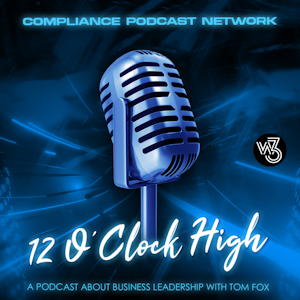Compliance Evangelist Tom Fox sits in for an insightful yet powerful conversation with James Gellert, Chairman and Chief Executive Officer (CEO) of Rapid Ratings International. In this episode, glean the lessons that companies should never forget from the 2008 Financial Crisis to the Coronavirus health crisis and the total evolution of the business of compliance.
Key points discussed in this episode:
✔️ Finance and financial health is an excellent example of a risk area that historically may have been isolated or siloed for the finance team or a finance person within the supply chain to look at. But in reality, all of these risks are connected.
✔️ Why the Rapid Rating approach helps companies manage their third-party supply chains through assessing financial health. We’ve seen significant changes over the last five to 10 years in the importance of financial health and how it helps define risk management programs.
✔️ Understand what a 3rd party ecosystem is and why companies need to understand the breadth and scope of their 3rd parties are really powerful. The more businesses can collaborate and communicate with each other, supply chain, risk management, supplier collaboration; these are crucial elements to creating the most robust ecosystem and benefiting both sides of that equation.
✔️ The silver lining to the Covid crisis made supply chain risk management stronger from now on, and more companies were able to adopt techniques than we ever had before.
✔️ More companies will benefit from more robust ecosystem creation and strengthening the ecosystems they’ve got into the future by embracing the importance of the digitalization of data they already have. Companies will need to spend a lot of time, money, and resources cleaning their data on their third parties and then implementing systematic approaches to managing those risks.
James H. Gellert is the Chairman and CEO of RapidRatings International. Previously, he was the Managing Partner of Howland Partners, LLC, and Howland Securities LLC, which provided consulting, business development, capital raising, and M&A advisory to companies in the financial information and technology markets. Before those positions, he served as CEO of a number of technology companies, including wireless software and research companies SkyScout and Unstrung.
Website: www.rapidratings.com
The “Nuts and Bolts” for Creating a Comprehensive Compliance Plan
This chapter of this unique work lays out a succinct yet thorough one month approach to operationalizing a company’s compliance regimen. Beginning with a section on what 2020 brought to the compliance landscape, each chapter methodically outlines best practices for everything from establishing policies, procedures, and internal controls, to assessing risk, training, handling investigations, and more. Each day ends with three key takeaways you can implement at little or no cost.
Understanding Compliance Responsibility Across the Organization
The Compliance Handbook also takes a close look at all professionals’ roles with compliance responsibility, from Compliance Officers and Boards of Directors to Human Resources, to Internal Audit and Internal Controls and Communications and Training professionals.
Order your copy OR copies of The Compliance Handbook: A Guide to Operationalizing Your Compliance Program. Save 25% off.
http://www.lexisnexis.com/fox25






